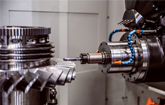Frost & Sullivan: Improving Quality of Engines at OEM-level Shrink Prospects for Remanufactured Aftermarket
-- Quality and price emerge as the two most competitive factors in the remanufactured engine aftermarket
MOUNTAIN VIEW, California, Aug. 6, 2013 /PRNewswire/ -- Still suffering from the economic slowdown, North American consumers of replacement remanufactured engines are showing a marked preference for products that are deemed trustworthy and from reputed companies. Participants in this aftermarket are struggling to stay afloat due to the increased durability, lower miles driven, longer warranties of original engines and the intensifying competition from the salvage industry.
New analysis from Frost & Sullivan (http://www.automotive.frost.com), Analysis of the North American Replacement Remanufactured Engine Aftermarket, finds that the market earned revenues of $3.62 billion in 2012 and is expected to reduce to $3.49 billion in 2019. The study covers the remanufactured gasoline engine and remanufactured diesel engine segments.
If you are interested in more information on this research, please send an email to Jeannette Garcia, Corporate Communications, at jeannette.garcia@frost.com, with your full name, company name, job title, telephone number, company email address, company website, city, state and country.
The increase in hybrid and alternative fuel vehicles will have a major impact on consumer's choices. While the demand for gasoline engines will dip in the long term, remanufactured diesel engines will gain, as a sizable number of light pickup trucks and package delivery trucks are shifting from gasoline to diesel engines.
"The proliferation of inexpensive engine parts and low-cost Asian imports will also create opportunities for the North American remanufacturers, as they will reduce the cost of remanufacturing," said Frost & Sullivan Automotive & Transportation Research Analyst Janardan Damani. "This, in turn, will help remanufacturers increase their profit margins."
While some segments of the aftermarket have gained from technological advances, others have been challenged. For instance, rapid technological progress has reduced core availability and increased core fall-out rate. Of the two, the core fall-out rate is a bigger problem, as two cores are needed on average to remanufacture one diesel engine. Furthermore, at times, remanufacturers even require three cores because testing for remanufacturing feasibility is more rigorous for diesel engines than for gasoline engines.
Domestic brand engines still comprise the vast majority of the remanufactured engine volume, but the market share is steadily declining due to a steady reduction in domestic brand vehicles in operation. On the other hand, the number of engine families is growing due to the penetration of Asian-branded vehicles and therefore, Asian-brand engines.
Meanwhile, the rise in fuel prices lowering average miles driven and the decreasing value of pickup trucks and SUVs with lower fuel economy, are diminishing the sales of remanufactured engine for these types of vehicles.
"The on-going trend of manufacturing high-quality engines is slashing the replacement rates in this market, thus threatening the existence of smaller players that are vulnerable to constricted profit margins," said Damani. "Smaller participants will either be forced to exit the market or be acquired by bigger companies, which will then consolidate their position."
Analysis of the North American Replacement Remanufactured Engine Aftermarket is part of the Automotive & Transportation Growth Partnership Service program. Frost & Sullivan's related research services include studies on replacement parts preferences among U.S automotive technicians evaluating brands and channels, the North American automotive aftermarket, and the anticipated growth in vehicle maintenance and repairs. All research services included in subscriptions provide detailed market opportunities and industry trends evaluated following extensive interviews with market participants.
About Frost & Sullivan
Frost & Sullivan, the Growth Partnership Company, works in collaboration with clients to leverage visionary innovation that addresses the global challenges and related growth opportunities that will make or break today's market participants.
Our "Growth Partnership" supports clients by addressing these opportunities and incorporating two key elements driving visionary innovation: The Integrated Value Proposition and The Partnership Infrastructure.
- The Integrated Value Proposition provides support to our clients throughout all phases of their journey to visionary innovation including: research, analysis, strategy, vision, innovation and implementation.
- The Partnership Infrastructure is entirely unique as it constructs the foundation upon which visionary innovation becomes possible. This includes our 360 degree research, comprehensive industry coverage, career best practices as well as our global footprint of more than 40 offices.
For more than 50 years, we have been developing growth strategies for the global 1000, emerging businesses, the public sector and the investment community. Is your organization prepared for the next profound wave of industry convergence, disruptive technologies, increasing competitive intensity, Mega Trends, breakthrough best practices, changing customer dynamics and emerging economies?
Contact Us: Start the discussion
Subscribe: Newsletter on "the next big thing"
Register: Gain access to visionary innovation
Analysis of the North American Replacement Remanufactured Engine Aftermarket
NABD-18
Contact:
Jeannette Garcia
Corporate Communications – North America
P: +1-210-477-8427
E: jeannette.garcia@frost.com
Twitter: @Frost_Sullivan or @FS_Automotive
Facebook: Frost & Sullivan
Join our LinkedIn Forum: The Future of Mobility




Share this article